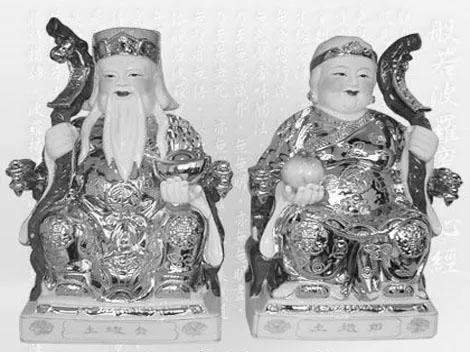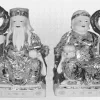Various names know the earth deity. He is also known as the Righteous Spirit of Fortune and Merit. His depictions often include a ruyi scepter and gold nuggets. Some people worship the earth deity as a bureaucrat or a protector.
Tu Di Gong is a Chinese earth deity.
In Chinese mythology, the Earth god Tu Di Gong is the protector of towns and villages. He is also called Da Po Gong and Tua Pek Gong by the Hokkiens and Teochews. His formal name is Fu De Zheng Shen, meaning “earth god of wealth and merit.” In ancient times, every village had a shrine to Tu Di Gong. He was in charge of village affairs, which were primarily agricultural. In Chinese belief, he was also seen as the god of wealth, prosperity, and good fortune.
The earth god is a genius loci who controls a specific region. The name Tu is derived from the Chinese character for “tu,” which means “bulging heap.” The earth god was worshipped in Earth God Temples, which were often small and spread throughout towns and villages. These temples were small but were perhaps symbolic of the Earth God’s humble status.
As the Earth god’s lowest ranking, Tudigong grants wishes according to the deeds of his worshippers. Tudigong is often worshipped before burial to return the body to the Earth. His other names include Grandfather or Great Elder Lord.
The Chinese pantheon includes many gods and goddesses, and each energy flow is attributed to a different god. Many of these gods have names that refer to certain animals. For instance, one god is called the Monkey King, a reference to the monkey. However, the natural hierarchy between the different deities is often brutal to comprehend the Chinese.
He is a protector
The Chinese view of gods is based on government organization in human societies. They imagine a divine bureaucracy that consists of multiple bureaucrat-gods, each of whom has a specific domain and function. Thus, the Jade Emperor in Heaven corresponds to the human Son of Heaven, who is in charge of the divine bureaucracy.
He is a descendant of Hou Tu.
According to Chinese tradition, the Earth deity is a descendant of the Yellow Emperor. He was an assistant deity of Huang Di, the god of the Celestial center. His role was to equalize all the provinces of the empire. He was also considered the soil deity and worshiped as a spirit. The Confucian Classic describes the Earth as a realm inhabited by ghosts.
In ancient Chinese culture, the “Hou” or “Hou Tu” (or Houtu) was the chief decision-maker and commander of all significant matters for the tribe. Tu means “Earth” or “land” and is often equated with “mother.” The corresponding female leader, or “Houtu,” was the goddess Nuwa. She was the creator of all life and the mother of all living things.
The Earth Gods were close to humans, often represented as married couples. Each village or neighborhood had its own Earth God, and many families had their own. The Earth Gods were closely connected to the human race and were believed to interact with humans. But they were not the only essential divinities.
The Huangdi, the first earth deity of human history, is a descendant of Hou Tu. Huangdi is related to Di Jun and the Yellow Emperor and was also mentioned in the Zhongshan Jing.
He is a historical person.
An Earth deity is a historical person in Chinese culture. The earliest reference to this deity is from the Han dynasty, around 113 BCE when the emperor Wudi began to worship him. Later, he became the dual patron deity of harvest and soil. He was honored and received sacrifices under the title of Shoji and was related to the gods Shen Nong and Gou Long.
Another historical person associated with the Earth is Yue Lao, a deity of love in Chinese mythology. This ancient figure is sometimes portrayed wearing a red band around his legs to represent the Chinese belief that love is a powerful force. In addition to this historical person, this deity is depicted as a wealthy god. It is often described as the Dragon Mother, a mortal woman who was deified after raising five dragon children.
According to legend, the Earth Gods were married couples and lived close to humans. Each major city had a City God appointed by the imperial government. Each administrative seat had a temple dedicated to its City God. Every major city was associated with a different City God and had its unique identity.
He is a spirit-tablet
A spirit tablet is a representation of a deceased ancestor. In Chinese culture, these objects are commonly placed outside homes or shrines. People often offer incense and food to these spirits twice a month, on the new and full moon. Many pre-modern Chinese villages have an earth deity shrine.







